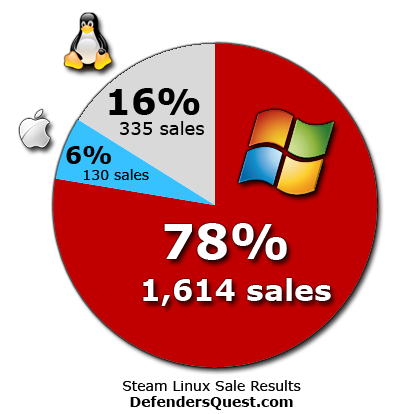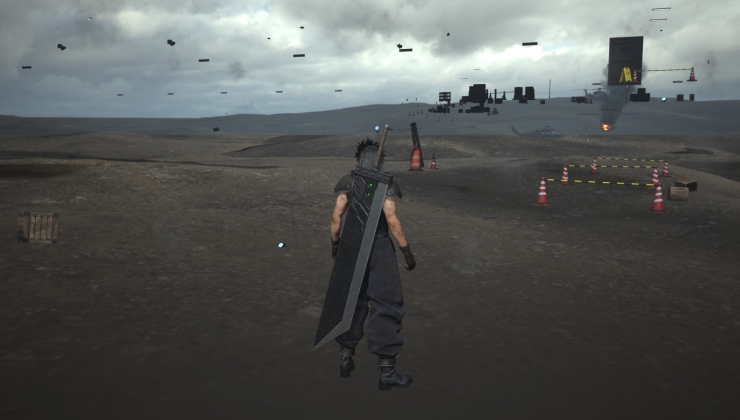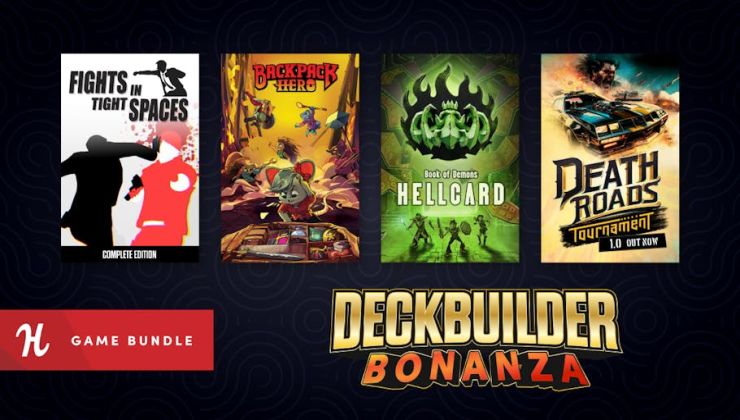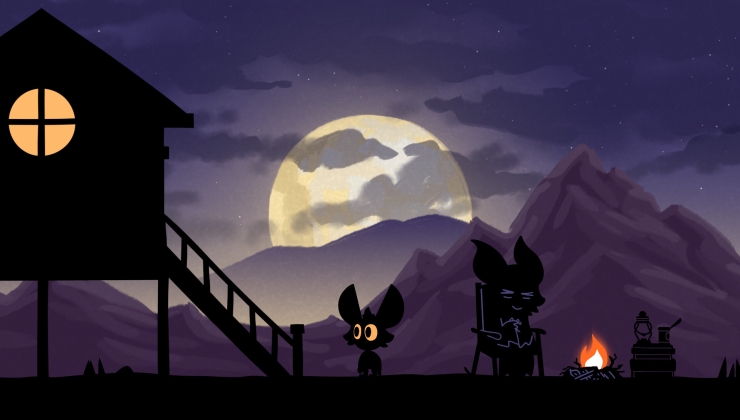If you are a regular visitor of this site, you probably want your Steam purchase to be counted as a Linux sale. But how does Steam actually consider you to be a Linux buyer? It's trickier than you think.
The described methodology comes from Defender's Quest Steam sale results blogpost from Lars Doucet, who asked Valve about this. There doesn't seem to be any official information posted about this anywhere, but there's no reason not to believe the blogpost. The methodology is:
QuoteMac/Linux sales are based on platform of purchase; or after 7 days, the platform with the most minutes played.
As you can see, there are several things to keep in mind, if you want your sale to count towards Linux purchases:
- Always try to buy the game from Linux, either Steam client running on Linux, or a web browser running on Linux. The platform of purchase is the default indicator of which platform the sale was intended for. So, for example, instead of buying the game from work (using Windows), wait and buy it at home (using Linux).
- The number of minutes played on each platform is evaluated 7 days after the purchase was made, and the platform with most minutes played is considered the final platform of sale. This step is ignored only if you haven't played the game during the week at all (all platforms have 0 minutes played), in that case the platform of purchase decides. Otherwise, the platform with most minutes played wins. This is very good to keep in mind especially if you decided to play this game on Windows instead of Linux (e.g. the Linux version doesn't work well on your system). If you want your purchase to count as Linux, Linux needs to have the most minutes played after 7 days. So you either need to wait a week before spending a lot of time in this game on Windows, or come up with some other solution (leaving the game running in the main menu in order to bump up the played time on Linux counts).
- On the 7th day after purchase, the target platform decision has been made, it's final, and it won't be ever changed. So, as the blogpost states, if you buy the game, play a few minutes on Windows just to test it, and then invest 60 hours on Linux into it after a few weeks... sorry, still counted as a Windows sale.
This was also echoed by Icculus earlier this year:
QuoteInstall and play it on Linux for the first week after you buy it and they consider it a Linux sale.
Source
I hope this helped people a bit to understand how the platform sale numbers work in Steam. I think we possibly lose quite a few Linux sales in statistics because people are not informed about the methodology. It certainly happened to me in the past, e.g. buying the game from Windows and then playing it on Linux a month later. Hopefully, more informed Linux gamers could mean more accurate statistics in the future :-)
Editorial Note
While this is how Steam calculates sales and certainly how porting houses like Feral or Aspyr are rewarded, some smaller developers may look at things like number of players or number of downloads and use this information as a basis on the market potential that Linux has for future ports. That said, it's never a bad idea to buy games after the Tux icon appears.





 How to set, change and reset your SteamOS / Steam Deck desktop sudo password
How to set, change and reset your SteamOS / Steam Deck desktop sudo password How to set up Decky Loader on Steam Deck / SteamOS for easy plugins
How to set up Decky Loader on Steam Deck / SteamOS for easy plugins
About the sales counting for Linux, it seems you can "heal" a Windows buy by playing on Linux - wouldn't recommend that, though.
Will this count after a week as a Linux sale although is a Windows only game? :)
Yes, but it needs to be done in a week after the purchase (the "most minutes played" rule). So you cannot do anything about a game that you owned for a long time and it suddenly received a Linux version.
Actually, there are some indications that it really does :-) Stanley Parable's developer claimed on the forum he could already see some Linux purchases, even though there's still no Linux version available. But this use case is most probably very rare. But yeah, it seems to work this way. On the other hand, it sends the message "even though I run on Linux, I'm willing to buy and play a Windows-only version of this game" (i.e. Wine or Windows in dual boot), so I'm not sure whether it incentivizes developers to provide a proper Linux version.
But I was scratching my head about another one:
Suppose I have a Windows somewhere in the house (or in the dog's house) and I also have a SteamOS Machine in my room.
So I purchase whatever game (possibly Windows only to make things more complicated) from the SteamOS Machine and play it only there (using streaming) for few weeks. (I don't even touch or see the Windows PC).
What kind of sale is this, a Linux or a Windows one ? :)
I'd say the host system decides, so if you stream it from a windows machine, it's a windows game, no matter where you stream it to. It's running on a windows machine.
Just my logic tho ^^
If the game ever gets ported by a porting company they won't game the money because the purchase was before the port, of course....
But still, will it count as Linux sale?
I'd say that this is the most likely scenario...but at the same time "I AM" playing it and purchasing it on a Linux machine...but then again...but...oh, screw it.
Now, what happens if I buy my games (windows and Linux) via my Android App? If it is a windows game and I never install it, it stands to reason that they will make it count towards a Windows purchase.
However, if it is a Linux & Windows game , and I install more than a week later on the linux platform, I surely hope that it will count as a Linux Purchase.
Also, what is the stand on DLC?
Same with a Windows game purchased on Linux and played in Wine. It will probably be a Windows purchase.
Aspyr or Feral, can't remember, said that Windows is the default.
So this would be a Windows sale.
For example, if you play TF2 on Windows for 20 hours but don't buy anything, and then months later switch to Linux and rack up 900 hours while spending a couple of hundred on hats, would that show up as Windows sales?
http://steamcommunity.com/app/221910/discussions/0/630799997727674721/#c540741859668535643
If a non Linux game can have Linux sales the platform of purchase must count, I can't see any other way to explain this. Humble Bundle does the same (Windows games can have Linux sales except that the user specifies the platform instead of being assigned automatically).
Another obscure point is: how a sale from a 3rd-party site is counted, if counted at all? It would be hilarious if my purchase of Borderland 2 from gameagent (Aspyr) counted as a Windows/Mac sale! (bought weeks ago and not played it yet)... although I guess in this case money count more than stats and 100% of my money went to Aspyr without Valve cut :)
So my theory is right? If you buy ON LINUX and never play it, it will count as Tux sale...?
very good question... This info should be visible or something
I bought TF2 almost at the very begining in windows, but I spent more time on it on linux by far.
I would quit playing if I knew it is counting me as a windows player. I have more than enough games to waste my time already and I dont want to contribute to swell windows numbers even by one thousandth :)
I want to think steam people looking at stats are playing dumb but looking at different figures that the ones they present to us. Just like with the survey. They know the exact hours my client is runnig and if is running in wine or in debian, but playing dumb at the same time like... yeah, we could have all this big data and analyze it... but we are just looking at this small percentage of it... bleh bleh bleh
While it is very nice to see X-COM, Bioshock, and Borderlands 2 show up in my Steam library, I regret(1) that they all count as Windows sales, and (2)that mostly, I can't afford to buy a game twice. I will say that I'd bought CIV V with no DLC. The day it came out for Linux for $16.99 with all the DLC, I certainly bought that.:)
Needless to say, since I eschewed dual-booting (I was annoyed with Mint's little indiosyncracies, but for real frustration, use Windows 7 after five years of Linux:><:), I have bought Linux games from a Linux version of Steam. It's the least I can do to atone for my dual-boot days...:(
Yes, point 2 is particularly important. I can't afford to pay twice for games, especially as I want to support as many indies as possible. I have c.900 games on my steam account... Now of course I always buy on linux only, or wait until a particular game is available on Linux.
That also could have been Wine... Could have been many things. The bottom line is that Valve needs to be a lot more open with these kings of things.